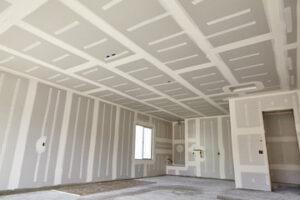Drywall Contractors Phoenix are professionals who install and finish drywall in residential and commercial buildings. They also perform various other tasks, including interpreting blueprints and collaborating with design teams.
To find the best drywall contractor for your job, check their online reviews and request references. You can also look for a portfolio of previous projects and samples of their work.
A drywall contractor installs and finishes drywall for residential and commercial projects. They use steel stud framing to build walls and ceilings, work with power tools like sawzalls and impact drills, and perform a variety of tasks related to construction projects. Their duties include estimating and planning, ordering materials, monitoring project progress, ensuring compliance with safety rules, and maintaining a clean job site. They also manage business needs, including employees, budgeting, and advertising campaigns.
Drywall contractors often charge per room or per square foot, and the cost will depend on several factors. These include the size of the room, type of drywall (standard or moisture-resistant), and the finish. Some companies may add extra costs for special requirements such as a smooth finish or window wraps. The drywall company must also factor in the cost of overhead and business expenses, which can increase prices.
Most drywall professionals estimate a price for the entire job after doing a walkthrough of the site. They will consider the square footage, material costs, and other costs such as travel and drywall finishing equipment. They will also take into account the complexity of the job, such as whether it involves cutting through beams or installing a fire-resistant wall.
The drywall contractor will also need to calculate labor productivity and ensure that their team is working on schedule. To achieve these goals, they need to have a tool that can accurately capture the amount of time each person is spending on the project. A modern workforce solution like Bridgit Bench can provide this information in real-time and allow managers to proactively manage the project’s productivity.
Managing a drywall project requires a lot of coordination between workers and other subcontractors. Because drywall is usually installed last, it is essential to coordinate the schedules of painters, plumbers, and electricians with those of the drywall crew. Otherwise, it can be expensive to lose labor hours because the subcontractors are waiting for a completed piece of drywall to install. This is why it’s important to choose a reliable drywall company that has a solid history of meeting deadlines and keeping the project on schedule.
Experience
Drywall contractors need to have a strong understanding of the building process. They need to be able to read blueprints, determine square footage and other important measurements, and understand the material costs of each project. They also need to have the skills to properly install and finish drywall, which can involve a lot of cutting and sanding. This is why it’s important to choose a contractor with extensive experience in the field.
Before hiring a drywall contractor, be sure to ask for references and check their online reviews. You should also look for a company with a track record of consistent quality work, not just one good job. In addition, it is a good idea to interview several potential drywall contractors and compare their communication styles, payment methods, and overall work style.
Some drywall contractors also offer service guarantees to help their clients feel confident in their services. These guarantees typically include a promise to finish the project on time and within budget. It is also a good idea to get a written contract with all of the details of your project. This will protect both parties and ensure that the contractor is held accountable if something goes wrong.
It is also important to hire a reputable and experienced contractor who is licensed and insured. This will ensure that the contractor is qualified to perform the job and can be trusted with your project’s valuable materials. A reputable contractor will also have the right tools and equipment to complete the job quickly and efficiently.
While many drywall contractors are licensed and insured, not all of them have the same level of experience. It is important to find a company that has been in business for a long time and has extensive experience with residential and commercial projects. They should also be familiar with the building codes and regulations in your area.
While it is tempting to save money by hiring a cheap drywall contractor, this may end up costing you more in the long run. Low-quality materials and workmanship can make your home look unfinished and detract from its value.
License
Drywall contractors, also known as hanger contractors, contract with clients to apply plasterboard or other wallboard to ceilings and walls of buildings. They can also apply blocks, strips, or sheets of acoustical material to reduce or reflect sound. This work requires a high level of physical strength and fine motor skills. It may also expose workers to health hazards. These include dust and fumes from gypsum, mica, talc, and respirable silica.
The license needed for drywall contractors varies from state to state, but most require at least some type of training. Some states require a minimum amount of experience as a journeyperson and a passing score on a standardized exam. Others have apprenticeship programs that last from 3 to 4 years. These programs combine classroom time and on-the-job training, which helps to improve the drywall contractor’s skills.
Before hiring a drywall contractor, it’s important to ask about their experience and whether they have insurance. This will protect you from financial liability in case something goes wrong during the construction project. You should also make sure they have the necessary tools and equipment for the job.
If you’re looking for a drywall contractor with an outstanding reputation, consider asking friends and neighbors for recommendations. They may be able to provide you with valuable insights into the company’s customer service and reliability. Additionally, it’s a good idea to ask about the quality of the materials they use and their overall pricing.
It’s also a good idea to check out the drywall contractor’s website for references and certifications. You should also look at their portfolio of past projects. This will help you determine if their work is up to par and if they’re a good fit for your project. You should also consider how long they’ve been in business. This is an indicator of their level of expertise in the industry.
Insurance
If you are thinking about hiring a contractor to put up your drywall, you should make sure that they have the appropriate insurance. Many states require that contractors carry liability insurance to be licensed. If you don’t know what kind of coverage you need, an independent insurance agent can help. They will review your specific business needs and recommend the right policies. They can also shop around to find the best rates. In addition to liability policies, a good drywall contractor should have workers’ compensation and business interruption insurance. The latter policy helps to pay for expenses incurred when the business must close temporarily due to fire, theft, and other threats. Workers’ compensation, on the other hand, provides coverage for employees who are injured on the job.
Drywall contractors use a variety of tools and equipment, from drywall lifts to taping knives. They are prone to breakage and loss, and can be expensive to replace. An inland marine policy, which is a form of commercial property insurance, can help cover the cost of tools and equipment that are lost, stolen or damaged. The cost of this type of insurance depends on the value of the tools and equipment.
Accidents and injuries are common in the construction industry, so it is important for drywall contractors to have adequate insurance. General liability insurance covers third-party bodily injury, property damage and advertising injury. In addition, it can also pay for legal fees and judgments. It is a requirement for state licensure and many general contractors will not hire subcontractors who lack this policy.
Workers’ compensation insurance is a must for all businesses, but it is especially important for drywall contractors. In the event that an employee is injured on the job, this insurance will help pay medical expenses and lost wages. In addition, if an employee is harmed by a co-worker, workers’ comp will provide compensation for the losses. Workers’ compensation insurance is required in most states, but if the contractor does not have this coverage, they should be denied access to jobs. If you want to learn more about the insurance requirements for drywall contractors, contact an independent agent.


